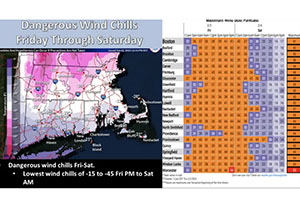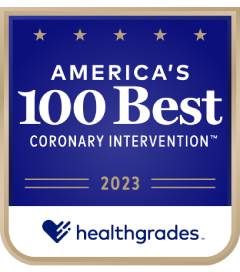Frostbite Can Set In On Exposed Skin In 10 Minutes
Feb 7, 2023
FRAMINGHAM – With a historic wind chill warning going into effect Friday morning, frostbite can set in on exposed skin in as little as 10 minutes.
When the weather is extreme like this, MetroWest Medical Center’s emergency department sees patients with serious health issues related to the dangerous weather.
The hospital is encouraging the community to stay inside and protect exposed skin if going outdoors during this weather event.
When your skin is exposed to extreme cold for a long period of time, you can develop frostbite. Frostbite causes damage to the skin and underlying tissue. An area of the body that has suffered frostbite will have hard, pale and cold skin. You may feel an aching pain and notice that the area is very sensitive to touch. As the area begins to warm up, it will become red and very painful.
Anyone can get frostbite, but people who are taking beta-blockers that decrease blood flow to the skin are more susceptible. In addition, if you have peripheral vascular disease, diabetes, peripheral neuropathy and Raynaud’s, you may have an increased risk. Smoking and windy weather may also increase the risk of frostbite.
“The first symptoms of frostbite are a sensation of pins-and-needles followed by numbness. The affected area may begin to throb or ache, and sensation may be lost,” says Dr. Lisa Sotir, Medical Director of the Emergency Room at MetroWest Medical Center. “Frostbite can be very serious. Very severe cases of frostbite can actually kill the tissue or damage the tendons, muscles, nerves and bone.”
If you notice symptoms of frostbite, you need to act quickly. Seek shelter from the cold or move to a warmer location. Remove any constricting jewelry and wet clothing. You can wrap the affected area with dry, sterile dressings.
Warm your hands by tucking them under your arms. If your nose, ear or face are affected, warm the area by covering it with dry, gloved hands.
- Do not rub or massage the affected area.
- Do not disturb any blisters that develop.
- Do not apply dry heat including radiators, campfires, heating pads or hair dryers to the area. You may burn the tissues that have been damaged by applying heat.
- Use warm water and not hot water for frostbitten hands or feet.
If the area stays numb while you’re warming it, seek immediate medical attention. You also should go to the emergency room if you notice blistering or develop a fever, feel ill, have discolored skin or drainage from the frostbitten area.
Dr. Sotir concludes, “You can prevent frostbite by dressing appropriately when you go outside in cold weather. Remember that mittens are warmer than gloves. Also wear two pairs of socks (cotton next to the skin with woolen socks on top) if you’re going to be outside for long periods of time. Wear a hat or scarf that covers the ears.”
In the event that you or a loved one need medical care during this weekend’s extremely chilly weather, the Emergency Room at MetroWest Medical Center is open and ready to care for you.


